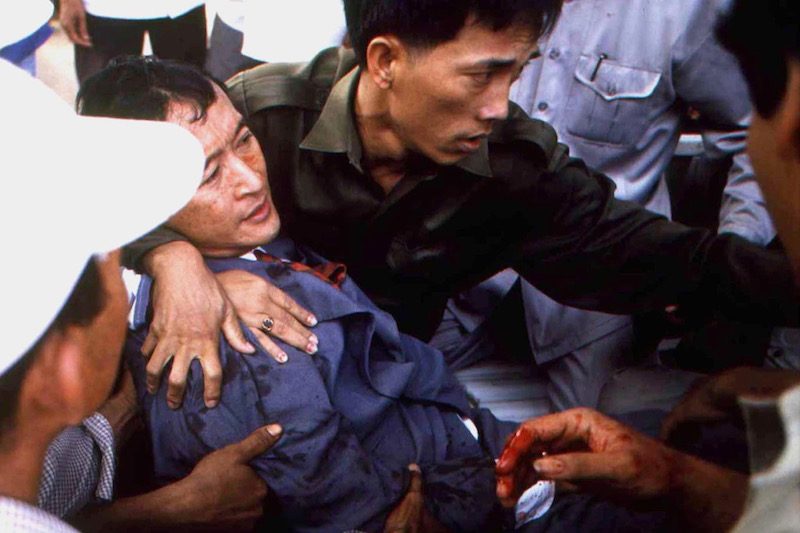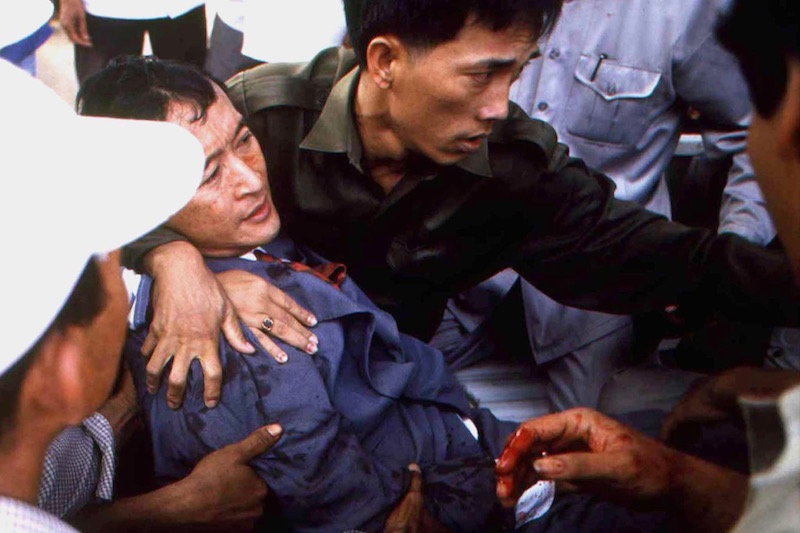Former opposition leader Sam Rainsy on Thursday used the 20th anniversary of the 1997 grenade attack on an opposition rally in Phnom Penh to encourage the families of the victims not to give up on their fight for justice, citing the eventual success in trying senior Khmer Rouge leaders for their crimes.
Speaking via Skype to hundreds of supporters at Wat Botum park, just meters from where 17 people were killed and more than 150 injured when a group of unidentified men lobbed four grenades into the rally he was leading, the exiled politician said the case would not remain unsolved forever.

“It’s almost 20 years and we should not forget that we have not found justice,” Mr. Rainsy told the crowd from his home in Paris. “Crimes that kill people, like the grenade attack, are unforgettable crimes.”
“It’s like crimes that were committed by the Khmer Rouge—even though it’s almost 40 years ago…the court still convicted those Khmer Rouge leaders,” Mr. Rainsy said. The regime’s second-in-command Nuon Chea and head of state Khieu Samphan were handed life sentences in 2014 for committing crimes against humanity.
Mr. Rainsy, who sustained minor injuries in the attack, acknowledged one of the main themes of the demonstration that fateful day—a raise in the minimum wage for garment workers—and called the victims “heroes” in light of the improvements in workers’ salaries, which have risen to $153 from $27 over the past two decades.
“The loss of our hero demonstrators has brought the light of freedom and change in people’s livelihood today,” he said.
Speaking after Mr. Rainsy and Kem Sokha, who has taken the helm of the CNRP, Chhoeng Rum, 78, who was at the demonstration when the grenades were left off, described the carnage created by the explosions two decades ago.
“People were shouting at the demonstration and then four grenades were thrown. I saw the grenade go into the place where lots of people were standing,” she said.
Once the grenade had exploded, Ms. Rum tried frantically to find her daughter, Kos Polin, who had also joined the rally.
“After the grenade went off, there were so many people lying on the ground in pools of blood. There was blood surrounding us everywhere,” she said.
She eventually located her daughter, who had shrapnel embedded in her thigh, and rushed her to the hospital. After recovering, she moved to France with the help of Mr. Rainsy, she added.
Despite Mr. Rainsy’s calls to continue the fight for justice, none of the relatives of survivors held out much hope that the courts would ever deliver legal redress to them.
“I don’t think the government can find justice for my son because the courts are under the influence of the government,” said Ly Neary, 75, whose son Chet Duong Daravuth, a reporter for the now-defunct pro-opposition Neak Prayuth (Fighter) newspaper, was killed in the blast.
Mr. Rainsy blamed Prime Minister Hun Sen for the attack. An FBI investigation, prompted by the injury of a U.S. citizen, was closed before it came to any hard conclusions. However, declassified FBI files show that the investigation was strongly leaning toward blaming the CPP for orchestrating the attack.
Ms. Neary said she was too scared to speculate on who was responsible for her son’s death.
“I dare not say who is behind the murder.”
(Additional reporting by George Wright)




